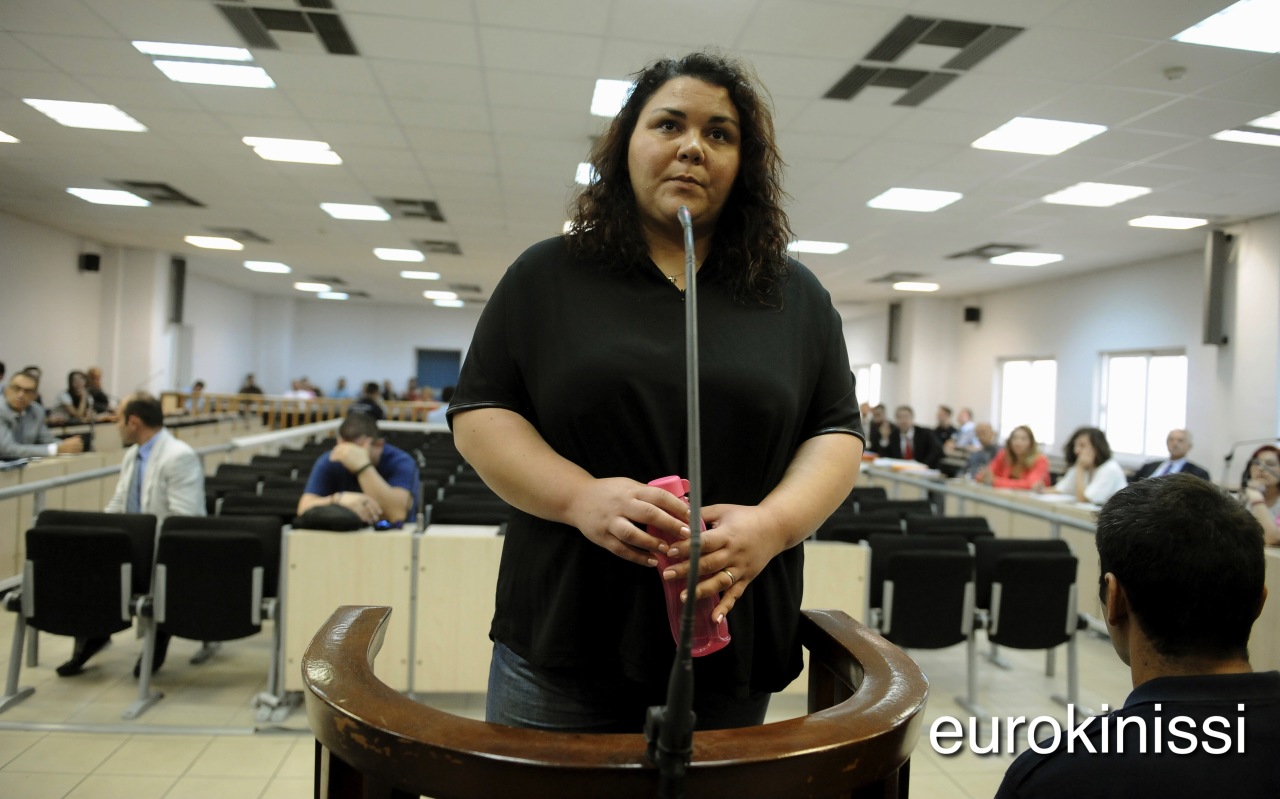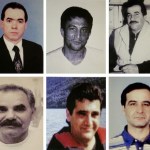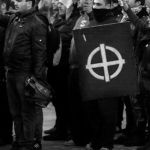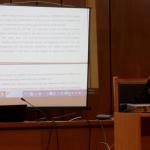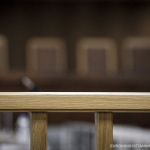82nd hearing, Women’s Wing, Korydallos Prison, September 8th, 2016
1. Access to the Court
The courtroom remains open to the public upon presentation of a state ID card, which is retained by court authorities for the duration of the session. There were journalists present and a very small number of spectators in the audience.
2. Presence and representation of the defendants
Present at the proceedings were two (2) defendants, I.-V. Komianos and K. Korkovilis.
3. Proceedings
Examination of witness Eirini Fyssas by the defense counsels
Several journalists approached the witness, Eirini Fyssas, standing between the bench and the witness stand, in order to photograph her. The presiding judge asked them to limit their actions to what is provided in the rules of the court. The witness stated that she wasn’t present, that the whole procedure is extremely painful to her, and that all that she knows she attempted to testify the previous time she was examined. She saw her brother dead in the hospital. All that she knows she learned from Pavlos Fyssas’ friends: She was trying to understand exactly what happened and they told her everything that took place. The witness recalls that her brother had gone to watch a football match and didn’t come back. She stated that the events that took place have been testified at the hearing and that she has nothing to add.
The presiding judge then asked the civil action counsels whether they wish to cross-examine the witness and they responded in the negative.
The presiding judge then asked the defense counsels whether they wish to cross-examine the witness.
Defense counsel V. Oplantzakis asked the witness whether her brother was a target of Golden Dawn and she stated that from what was said at the hearing it appears to be so. Responding to further questions by the aforementioned defense counsel the witness answered that she didn’t know whether her brother was a target and said that his songs were songs about love etc.
Responding to questions by defense counsel D. Velentza, the witness stated that all that she knows she learned from certain persons, for example Chryssa Tosloukou etc. She stated that she knew Tosloukou before the incident and that her brother was living with Tosloukou and her parents for some time, in the address 28, Kaliakaki St. Immediately after her testimony the witness left the courtroom, obviously distressed and supported by her father.
4. Continuation of comments by the defense counsels concerning the witness testimonies
Defense counsel Oplantzakis stated that under article 358 of the CCP the reliability of the witnesses is of extreme importance, not only at the hearing but in their preliminary testimonies in police stations etc. He wondered then when the memory of an incident is stronger: 16 hours after the fact or months later? He stated that his appraisal will be founded on the questions he posed to the witnesses. As for Mr. Christidis, who dropped the “bomb” concerning Mr. Dendias’ presence, he made no further comment, and stated that he would wait for the proposal by the state prosecutor. Concerning the testimony by Ch. Roupakia, who at the period that the attack took place was a Golden Dawn sympathizer, or at the very least a supporter, he is of the opinion that her testimony which showed that she does not believe that her brother committed the murder should be taken in the account. Her information concerning the events of the night in question came from her brother and from social media. Concerning the witness testimony of N. Chatziefstratiou, the defense counsel is of the opinion that he is not a reliable witness, since he isn’t an eyewitness. Concerning the testimony by N. Mantas, the defense counsel commented on his appearance and suggested that it’s possible that he does not respect either his oath or the truth. The defense counsel mentioned that all the friends of Pavlos Fyssas have said that they had no interest in watching the football match on the night in question. The defense counsel believes that the witnesses contradicted their earlier testimonies, the prelininaries and the hearing, and mentioned briefly Melachrinopoulos, N. Mantas, M. Ksypolitos, and Kontonikolas. As for the police officer eyewitnesses the defense counsel mentioned A. Tsolakidis, who mentioned “factual consistency”. The aforementioned witness indirectly said that the movement of the twenty had as a result the arrest of Ch. Roupakias by the police officers, and that he didn’t know anything about accessory actions and how a premeditated murder is committed. Concerning D. Chatzistamatis, because of what he testified, 18 people stand accused. Tsolakidis testified that he didn’t hear rallying cries. As for the knife’s “rotation”, the defense counsel requested the testimony of a forensic surgeon, but the court rejected his motion. Finally, he maintained that for someone to ascend the hierarchy, he has to be out of prison and act that way, while Roupakias acted differently and ended up in prison.
Defense counsel D. Velentza mentioned in brief the testimony of D. Vintsis. According to the signal, he referred to a confrontation. He also mentioned the fake security cameras in the shop of Christidis and that the next day minister Dendias visited the shop. The shopkeeper of the shop Patistas testified the same, stating that the chief of police came to the scene. According to the testimony by Ch. Roupakia, her brother was a truck driver for a petrol company, and also worked in a shop selling fish supplies, where he needed the knife to open cartons. The aforementioned witness’s private discussion, for which she was examined by the investigating judges, should not be used. She was the sister of the defendant, owner of both the car and the knife. Concerning the witness N. Mantas, he didn’t testify anything regarding the indictment for criminal organization, being in no position to do so. The indictment mentions “rallying cries”, however the aforementioned witness didn’t hear anything of the sort, neither did he hear military commands or orders. The aforementioned witness maintained that he wasn’t acquainted to half the people in the group that had gathered in the cafeteria, and that Fyssas and his friends remained outside Koralli on Tsaldari Ave. for about 20’. The witness testified that he was searched thoroughly in the police station, and that despite the fact that he makes music, he couldn’t mention a single line of his songs. The defense counsel maintained that the aforementioned witness is a unionist, is not an objective witness, and contradicts himself, and that he was in Nikaia on that day even though he is a resident of Egaleo. Concerning Ksypolitos, the defense counsel maintained that he is a proponent of a certain political ideology, and a member of a specific party, and that he testified nothing concerning the accusations about Golden Dawn being a criminal organization, neither did he have something relevant to say based on his own experience. He couldn’t name a single Fyssas song aimed at Golden Dawn. According to the defense counsel, the songs in question are not aimed at Golden Dawn. The aforementioned witness testified that the whole group was passing to the other side of Tsaldari St., which means that 11 persons were passing from that spot and remained there for several minutes. The witness didn’t hear any commands being given, neither did he notice coordinated movements. He heard of the incident in question only after the police arrived on the scene. Concerning the witness Chatzieftstratiou, he too has added nothing to support the accusation of a criminal organization. According to his testimony, when Fyssas was asked why they were staring at him in the cafeteria, the witness told him “They’re Golden Dawn, pay no mind”. Concerning Tsolakidis, he testified that the DIAS team arrived by chance on the scene mentioned by the signal, because the signal “Ifigeneias and Tsaldari there’s on” means nothing. The same witness testified that he referred to “Golden Dawners” based on the information by Chatzistamatis, and that he himself saw nothing to support the claim, such as insignia etc. The defense counsel maintained that the group labeled as Golden Dawners have been “curiously upgraded”, since there is nothing in the recorded discussions that supports the fact. She stated that Roupakias didn’t try to conceal his body type or his characteristics. She also stated that the incident took place outside well-lit shops, with security cameras installed. The defense counsel commented on the lamentable attempt to involve more people in the incident, who had departed the scene 2,5’ before it took place. In conclusion, the defense counsel stated that none of the witnesses had any evidence to support the claim of a criminal organization.
Defense counsel Tsagas stated that his principal had no involvement in the murder, since he wasn’t present at the scene of the crime. According to the defense counsel, Chatziefstratiou and Kontonikolas testified that they didn’t identify him when their group went into Koralli Café. His identification by Mantas and Ksypolitos is problematic, because they contradict their earlier statements. As for whether there was an organized plan implemented on the night in question, the defense counsel stated that it was shown it was merely a random incident: Fyssas went to Koralli by coincidence, so his murder couldn’t have been planned in advance. There was no one to obstruct the arrest of Roupakias, let alone an organized group. According to the defense counsel, there’s nothing in the testimony of Kontonikolas that shows that the attack happened in waves. Also, according to the defense counsel, Roupakias arrived on the scene alone, in a car that had license plates, in a spot that had cameras and people, and that he left the knife on the ground on his own accord. The above does not constitute the modus operandi of organized crime, according to criminal law. As for instigation, the defense counsel commented that the knowledge and acceptance of the act perpetrated by Roupakias wasn’t conclusively shown in the testimonies, since it was an act that lasted for the briefest period of time. He also believes that it was shown that Fyssas wasn’t a member of an organization, and exercised nonexistent influence on a political or ideological level, and so wasn’t a person with a public activity that would justify such an act. In conclusion, concerning his principal, nowhere was it shown that he participated in the murder or in a criminal organization.
Defense counsel M. Papadimitriou then supported that concerning her principal, Santorinaios, no evidence was put forth to suggest that he was involved.
Defense counsel Bonis commented on some contradictions: None of the witnesses testified that there was a confrontation or cause for a dispute, that Tosloukou didn’t appear, that Tsalikis was targeted, but none of the witnesses testified that they saw him again. The defense counsel maintained that Chatzistamatis was the more “observant” of the group and finally identified only Roupakias, and his testimony was mired in contradictions. In conclusion, the defense counsel supported that his principal’s involvement cannot be proved, since Roupakias came, attacked, and tried to leave the scene in his car. It all happened very fast, he wasn’t cheered on, and there was no time to something like this.
Defense counsel Pantazi mentioned that her principals Alexopoulos and Boukouras are members of a political party with specific positions and rightist leanings, and they have nothing to hide. She maintained that they had nothing to do with a criminal organization, since there was no criminal intent, and that nothing of the sort was shown in the witness testimonies so far.
Defense counsel A. Dimitrakopoulos stated there’s no ground to include his principals, Arvanitis and Iliopoulos, under article 187 CCP. He disputed the testimony of Chatzistamatis and mentioned that, according to Christidis, the minister of public safety visited his shop, something which shows the nature of the prosecution.
Defense counsel Zografos then stated that the friends of Fyssas were left with the impression that anyone could have been killed on that day. The defense counsel then maintained that there were contradictions in Chatzistamatis’ testimony because he was pressured. He also said that Christidis was “a bolt out of the blue”, because he testified that minister Dendias conducted an on-site questioning, something that is not included in his duties. Concerning Tsolakidis, the defense counsel believes that his testimony confirmed the police officers’ fear of responsibilty, but also that he mentioned a fight.
Defense counsel Papadellis referred to article 358 CCP which concerns the comments on witness testimonies, and that it would be interesting to hear the state prosecutor’s comments. The defense counsel spoke at length about the disciplinary action against Chatzistamatis. The defense counsel believes that there’s an organized effort to convict a crime that hasn’t been committed, and that there’s not enough evidence to infer the existence of a criminal organization. He also said that the friends of Fyssas testified under emotional duress.
Defense counsel Michalolias G. supported that the number of persons that were involved wasn’t shown conclusively from the testimonies of Fyssas’ friends, of the police officers, or of Chatzistamatis. The defense counsel stated that everything is considered a weapon, that the signal was inconclusive, and that it wasn’t shown that it was a group action. He considers that 18 persons are accused merely because they were present at the scene, because they have a particular ideology, and because they wore specific clothes. He also believes that there are contradictions, especially in the prosecutor’s proposal, the testimony of Chatzistamatis, and that 8-10 people that weren’t interested in football went to a café to watch a football match, and that one of the witnesses did not testify. The defense counsel said that the attack against Fyssas is based on the fact that he was an antifascist, but it wasn’t shown that he was member of a particular group. According to the defense counsel, there has been an attempt to conjure a criminal organization from a random event. The defense counsel also commented on the fact that the disciplinary action against Chatzistamatis is based on his testimony before the court. Concerning Tsolakidis, his testimony completely changes what is under discussion, since he testified about a “mob”, and about people that were fighting. In conclusion, according to the counsel, the testimonies didn’t prove anything about weaponry, the training of people, or a criminal organization.
Defense counsel A. Alexiadis referred to a murder of three people in N. Irakleio and stated that that crime was indeed perpetrated in cold blood. Concerning the incident in question, though, since there was a “mob”, things are different. No evidence was put forth to support the existence of a criminal organization. The media, however, have created a new reality to which the witnesses have completely subscribed. According to the defense counsel, we lack basic information, documents, and witnesses. The defense counsel stated that the minority vote of judge of appeals N. Salatas in the indictment was absolutely justified.
The court was adjourned for September 9th, 2016, when the testimony of Abouzide Embarak, a fisherman and victim, will begin.
Before leaving the bench, the presiding judge announced the court dates for October: 11 and 24/10 in the Women’s Wing of Korydallos Prison, and 5, 7, 13, 14, 18, 20, and 31/10 at the Court of Appeals.

